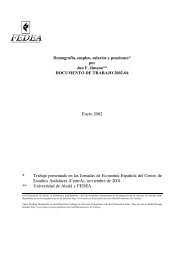The Evolution of Retirement by J. Ignacio Conde-Ruiz* Vincenzo ...
The Evolution of Retirement by J. Ignacio Conde-Ruiz* Vincenzo ...
The Evolution of Retirement by J. Ignacio Conde-Ruiz* Vincenzo ...
You also want an ePaper? Increase the reach of your titles
YUMPU automatically turns print PDFs into web optimized ePapers that Google loves.
<strong>The</strong> <strong>Evolution</strong> <strong>of</strong> <strong>Retirement</strong> ∗<br />
J. <strong>Ignacio</strong> <strong>Conde</strong>-Ruiz<br />
Prime Minister’s Economic Bureau and FEDEA<br />
<strong>Vincenzo</strong> Galasso<br />
IGIER, Università Bocconi and CEPR<br />
Paola Pr<strong>of</strong>eta,<br />
Università di Pavia and Università Bocconi<br />
February 2005.<br />
Abstract<br />
We provide a long term perspective on the individual retirement behavior<br />
and on the future <strong>of</strong> early retirement. In a cross-country sample, we<br />
find that total pension spending depends positively on the degree <strong>of</strong> early<br />
retirement and on the share <strong>of</strong> elderly in the population, which increase<br />
the proportion <strong>of</strong> retirees, but has hardly any effect on the per-capita pension<br />
benefits. We show that in a Markovian political economic theoretical<br />
framework, in which incentives to retire early are embedded, a political<br />
equilibrium is characterized <strong>by</strong> an increasing sequence <strong>of</strong> social security<br />
contribution rates converging to a steady state and early retirement. Comparative<br />
statics suggest that aging and productivity slow-downs lead to<br />
higher taxes and more early retirement. However, when income effects<br />
are factored in, the model suggests that periods <strong>of</strong> stagnation — characterized<br />
<strong>by</strong> decreasing labor income — may lead middle aged individuals to<br />
postpone retirement.<br />
Keywords: pensions, lifetime income effect, tax burden, politicoeconomic<br />
Markovian equilibrium<br />
JEL Classification: H53, H55, D72<br />
∗ Paola Pr<strong>of</strong>eta, paola.pr<strong>of</strong>eta@unibocconi.it. Jose <strong>Ignacio</strong> <strong>Conde</strong>-Ruiz, jiconde@presidencia.gob.es;<br />
<strong>Vincenzo</strong> Galasso, vincenzo.galasso@unibocconi.it. We thank<br />
J.F.Jimeno for many useful comments and suggestions, G.Casamatta, P. Poutvaara and<br />
participants to the Fourth CEPR/RTN workshop “Financing <strong>Retirement</strong> in Europe” at<br />
CORE, Louvain-la-Neuve and to the 2004 Annual Meeting <strong>of</strong> the IIPF. All remaining errors<br />
are ours. Part <strong>of</strong> this paper was written while P.Pr<strong>of</strong>eta was research fellow at CORE,<br />
Université Catholique de Louvain, under the CEPR-RTN Project “Financing <strong>Retirement</strong><br />
in Europe”. Financial support from Fundación Ramon Areces and Fundación BBVA is<br />
gratefully acknowledged. <strong>The</strong> views expressed herein are those <strong>of</strong> the authors and not<br />
necessarily those <strong>of</strong> the Spanish Prime Minister’s Economic Bureau.<br />
1






